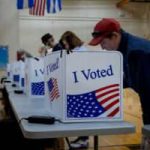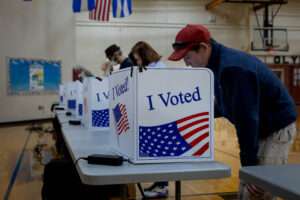
PHOTO ILLUSTRATION BY FIVETHIRTYEIGHT / GETTY IMAGES
Welcome to Pollapalooza, our weekly polling roundup.
What is art? According to the Russian writer Leo Tolstoy, the activity of art is “to evoke in oneself a feeling one has once experienced, and having evoked it in oneself, then, by means of movements, lines, colors, sounds, or forms expressed in words, so to transmit that feeling that others may experience the same feeling.” But, according to a new poll, many Americans believe art is just old paintings and sculptures they couldn’t make themselves.
Two weeks ago, YouGov showed 1,000 U.S. adult citizens pictures of famous art pieces and asked them questions about the works specifically and their views on art generally. It was a creative use of YouGov’s online polling methodology (after all, you can’t show pictures of art to respondents of a traditional phone poll) and revealed a lot about Americans’ artistic tastes.
According to the poll, 13 percent of Americans considered themselves very artistic, and another 36 percent considered themselves somewhat artistic. However, 48 percent considered themselves not very artistic or not artistic at all. And only 33 percent said that artistic painting came naturally to them (this number will become important in a minute).
Only 39 percent of Americans said that they were very or somewhat familiar with famous art movements or styles. In comparison, 58 percent said they were not very or not at all familiar with them. When asked about specific styles, people who were very, somewhat or not very familiar with artistic styles favored “classic art” the most.
Are Americans OK? | FiveThirtyEight Politics Podcast
Americans like old art
Share of Americans who love, like, hate or dislike various artistic styles, among those who said they were very, somewhat or not very familiar with artistic styles
| Style | Love or like | Dislike or hate | Diff. |
|---|---|---|---|
| Classic art | 87% | 7% | +80 |
| Expressionism | 71 | 14 | +57 |
| Street art | 71 | 18 | +53 |
| Modern art | 70 | 19 | +51 |
| Surreal art | 66 | 18 | +48 |
| Digital art | 63 | 18 | +45 |
| Abstract | 66 | 24 | +42 |
| Pop art | 65 | 23 | +42 |
Eighty-seven percent of respondents said they either loved or liked “classic art,” versus just 7 percent who said they disliked or hated it. More recent artistic styles were still popular but had lower net favorability. For example, the turn-of-the-century style Expressionism had a +57 net favorability rating, Surrealism (which began around 1920) had a +48 rating and pop art (the 1950s and 1960s) clocked in at +42.
When YouGov asked respondents to react to seven specific paintings and sculptures, these preferences appeared again. At least 84 percent of American adults said they personally considered the four works created before 1900 to be art. But only 51 percent considered Piet Mondrian’s “Composition with Red, Blue and Yellow” (1930) to be art, and only 43 percent said the same of Sam Gilliam’s “Coffee Thyme I” (1980).
Americans don’t think modern art is art
Share of Americans who consider seven famous paintings or sculptures to be art
| Artwork | Year | Share who said it’s art |
|---|---|---|
| “David” by Michelangelo | 1504 | 84% |
| “The Milkmaid” by Johannes Vermeer | 1660 | 90 |
| “Self-Portrait with a Straw Hat” by Vincent Van Gogh | 1887 | 90 |
| “The Basket of Apples” by Paul Cézanne | 1893 | 89 |
| “Movements” by Marsden Hartley | 1913 | 76 |
| “Composition with Red, Blue and Yellow” by Piet Mondrian | 1930 | 51 |
| “Coffee Thyme I” by Sam Gilliam | 1980 | 43 |
YouGov also asked Americans if they thought they could replicate each of these works if given the appropriate materials and time. And despite their answer to the earlier question about their artistic skill, 65 percent of Americans thought they could definitely or probably reproduce the Gilliam painting, and 77 percent thought they could reproduce the Mondrian.1 That suggests that Americans’ relative distaste for modern art is related to its apparent simplicity. According to at least some Americans, something can be art only if it’s technically difficult to make. (Never mind the inspiration required to come up with the idea for the image in the first place.)
This poll is relevant to politics too. Last month, a principal in Tallahassee, Florida, resigned after failing to notify parents before sixth-grade students at her school were shown images of Michelangelo’s “David” (depicted nude). The incident touched off a debate over parental rights and the nature of art. YouGov asked about this, too. Seventy-five percent of respondents said that the statue is not pornographic (siding with Marge Simpson over Helen Lovejoy), while 16 percent thought it was. But 67 percent also said parents should be notified before their children are shown artwork depicting nudity, while 21 percent said parents didn’t need to be informed. And when YouGov straight-up asked if students of different ages should be shown a full-length photo of “David,” Americans were split. Seventy percent of respondents said it would be appropriate in high school, while 20 percent said it would not. But only 48 percent said it would be appropriate in middle school, while 38 percent said it would not. And only 31 percent thought it would be appropriate in elementary school, compared to 55 percent who thought it would be inappropriate.
The definition of art is subjective (in fact, a plurality of Americans said so in the poll). But, if you’re someone who believes that the majority should rule, polls provide a means to an objective answer. And that, in turn, raises uncomfortable questions: Can something still be considered art even if 95 percent of people think it isn’t? Or should public opinion about art even matter? Where should we draw the line?
I don’t have answers to these questions. But if I have to stay up at night pondering them, you do too.
Other polling bites
- Last Friday, a judge in Texas suspended the Food and Drug Administration’s approval of the most commonly used abortion drug (although a higher court has since reinstated it, with restrictions). According to a Pew Research Center poll conducted just before that decision, though, banning medication abortion would be unpopular. Fifty-three percent of adults said it should be legal in their state, and only 22 percent said it should be illegal.
- Israeli Prime Minister Benjamin Netanyahu’s controversial plan to reform Israel’s judiciary has turned most Israelis against him. The plan, which would have given Netanyahu’s government the power to appoint judges and parliament the power to overturn their decisions, triggered mass protests, a general strike and cries of democratic backsliding before Netanyahu put it on pause late last month. According to a poll conducted on April 4 by Morning Consult, 76 percent of Israeli adults said the nation was on the wrong track, versus just 24 percent who said it was headed in the right direction. And Netanyahu’s net approval rating is a dismal -35 percentage points (28 percent to 63 percent), down 18 points since March 15.
- French President Emmanuel Macron also faced large-scale protests after forcing through an unpopular plan last month: a proposal to raise the retirement age for most French workers from 62 to 64. And according to Morning Consult, French adults now say their country is on the wrong track versus headed in the right direction, 81 percent to 19 percent, as of April 11. And Macron’s net approval rating is now -50 points (23 percent to 73 percent), down 24 points since last Christmas.
- According to the Pew Research Center, 17 percent of American adults said they have used a cryptocurrency, with young men leading the way (41 percent of men between 18 and 29 said they had used a cryptocurrency). However, the vast majority (75 percent) of Americans who have heard of cryptocurrency say they are not confident in its reliability or safety. Eighteen percent are somewhat confident, and only 6 percent are very or extremely confident.
- According to a new YouGov poll, 38 percent of Americans considered themselves introverts, and 22 percent considered themselves extroverts. However, 31 percent said they were about an equal mix of extroverted and introverted.
Biden approval

According to FiveThirtyEight’s presidential approval tracker,2 43.0 percent of Americans approve of the job President Joe Biden is doing, while 52.2 percent disapprove (a net approval rating of -9.2 points). At this time last week, 42.7 percent approved and 52.8 percent disapproved (a net approval rating of -10.1 points). One month ago, Biden had an approval rating of 44.0 percent and a disapproval rating of 51.1 percent, for a net approval rating of -7.1 points.


